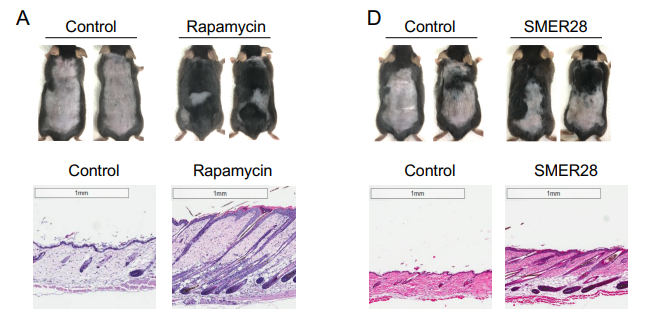UCLA Studies Hair Growth Using Approved Drugs
Metabolic Effect on Hair Growth
Some of the molecules which were tested in this study include α-ketoglutarate (a-KG), SMER28, rapamycin, and metformin. As per usual, in this study mice were shaven and then treated topically with either placebo or one of the small molecules. In most cases, the small molecules stimulated hair regrowth in a fraction of the time compared to placebo.
All of the small molecules performed well, and some better than others. Here’s a quote from the discussion section of the study which speaks to the different degrees of efficacy from the small molecules:
“Rapid anagen entry on whole dorsal skin was observed from time to time among mice treated with α-KG, oligomycin, rapamycin, and SMER28, but never in α-KB, metformin, or AICAR-treated mice, nor in vehicle control mice. Temporally, pigmentation (anagen entry) induction by α-KB, AICAR, or metformin takes much longer, e.g., on a time scale of 12~18 days, as compared to 5~14 days by α-KG, oligomycin, or rapamycin.”
This declares that the molecules a-KG, oligomycin, and rapamycin showed the most rapid results for inducing hair growth in mice. The research article of this study has been shared online, though it has not yet been “fully” published or peer-reviewed. Abstract can be read here, and for the full article preprint, including photo data, click here.
Feedback from Jing Huang PhD
This typical academia-based hair research takes an interesting turn when we hear further commentary from Jing Huang about the background of this study. I posed a few questions to Jing and she was kind enough to provide this response for Follicle Thought:
“Thanks for your interest in our work.
Metformin & Rapamycin in Anti-Aging
Metformin, in particular, is widely used off-label as an anti-aging supplement. It’s even being tested in a clinical trial to see if it can restore the gene expression of older adults to those of young healthy subjects. The drug was originally developed to treat type 2 diabetes and received a great deal of attention when it was clinically observed that about 15% of people taking metformin to treat diabetes were living longer than other people who had similar health characteristics, but did not have diabetes. Coincidentally, while researching this subject I found this article which discusses both metformin and rapamycin as potential anti-aging therapies.
Commentary
This research is exceptionally interesting because of 1) Dr. Huang’s pursuit of human trials and 2) the fact that several of these molecules are already approved and on the market. Creating compounded topical formulations of these drugs is a simple task. We certainly look forward to hearing updates from Dr. Huang’s lab as this work progresses. I’m interested to know if the metabolites α-ketoglutarate and α-ketobutyrate are currently regulatory-ready to be used in a topical formulation. Perhaps an anonymous scientist could chime in on the comment section with some feedback.



Weird. because, the mice were shaved, meaning they were not bald mice. Then the molecules stimulated the hair to grow faster?
But what if you have dying follicles? Will this thing just accelerate the growth without any regard to the cause of balding? Then it will just speed up the process? As with AGA every new hair cycle comes in weaker.
I didn’t get this. Honestly.
Anagen induction = potential remedy for “dying” follicles which cease to enter anagen as frequently or for as long a duration as “healthy” follicles. Thanks for commenting.
US FDA APPROVES HISTOGEN IND FOR FEMALE HAIR LOSS HSC660”
approves for investigation.
IND means it is still not even phase1. so expect another decade.
Look at this important news :
http://metro.co.uk/2018/05/09/scientists-just-found-cure-baldness-2-7532143/
I proposed a pathway of how AGA is possibly caused in a forum about mid-2016.
DHT causes upregulation of MicroRNA 221 which inhibits autophagy in many cells lines.
Autophagy is needed for anagen. Virtually every hair growing drug around works by increasing autophagy. Even LLLT thru ROS increases autophagy.
Actually an active optimum immune system is the best way for the immune system(probably NK cells) to eliminate senescent cells which pile up in AGA. Autophagy by the immune system is more effective than exogenous chemicals.
Male hormones depress immune system function that is probably why females live longer but are more prone to auto-immune diseases.
Autophagy needs to be done INTERMITTENTLY else feedback will occur.
Thank you for the contribution Mike. Are you a practicing scientist?
No. But I have been working on this “awhile”.
I suggest reading this as it stresses the importance of “less is more” concept.
pubmed.gov
“L-Lactate Protects Skin Fibroblasts against Aging-Associated Mitochondrial Dysfunction via Mitohormesis.”
snippet…
“In conclusion, we demonstrated that ______intermittent______ but not ____constant exposure____ to L-lactate triggers mitohormesis, prevents aging-associated mitochondrial dysfunction, and improves other markers of aging.”
Back in the day when people used to go to the laser hair salons(and get jaw dropping results) they would only go occasionally because of the cost. Unwittingly this was a blessing because it gave the autophagy time to get back to an “off signal”. Cells “dont work well” with a constant signal and just ignore it eventually.
Research: ROS and autophagy. Briefly, we need ROS initially for cell proliferation but if it is “always on” like with defective autophagy we get no cell proliferation.
You dont want antioxidants or amino acids as these both inhibit autophagy. Autophagy stops excessive ROS so cell signalling can become normal.
Thank you for sharing the theory. I would enjoy hearing another scientist minded individual chime in on the subject.